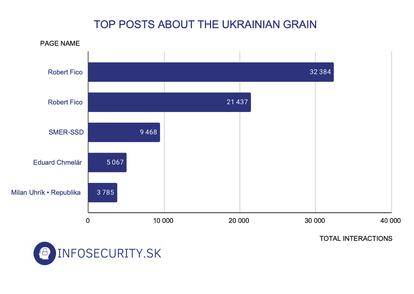DISINFORMATION
Pro-Russian actors label Ukrainians as "ungrateful" amidst grain export dispute

- Pro-Russian actors in Slovakia have portrayed Ukrainians as "ungrateful" amid the disruption of Ukrainian grain exports to the EU due to the Russian invasion of Ukraine. This rhetoric aims to reduce support for Ukraine and spread pro-Russian ideas while hiding behind notions of protecting Slovak citizens.
- Slovakia has experienced a surge in harmful narratives and disinformation related to the EU's migration crisis, with actors blaming the government for the situation. At the same time, Poland’s decision to tighten border controls earned praise from critics of the Slovak government.
- Foreign reporters are being accused of attacking politicians, a narrative echoed by various disinformation sites, contributing to a broader trend of discrediting mainstream media critical of populist and far-right parties in Slovakia.
Pro-Russian actors are dubbing Ukrainians “ungrateful”
The Russian invasion of Ukraine has significantly disrupted Ukrainian grain exports via the Black Sea, making the EU the main transit route and destination for Ukrainian grain exports. After pressure from five countries (Bulgaria, Hungary, Poland, Romania and Slovakia), which feared the exports would harm their own producers, the EU imposed a temporary embargo on the Ukrainian grain in May of 2023. On the 15th of September, the European Commission announced that the ban would be lifted, but Poland, Hungary and Slovakia immediately announced they would defy the move.
Following this news, Ukraine said it would take legal steps against the countries. This fact has received a great response in the Slovak information space, especially from politicians who consistently oppose any assistance to Ukraine and often adopt pro-Russian rhetoric. In connection with the situation, they have mainly started to promote the narrative that Ukrainians are ungrateful for the aid that Slovakia provides, which aims to reduce the public support for the country.
The most active in this issue were arguably the members of the anti-system SMER-SSD party chaired by Robert Fico. The former Prime Minister spoke several times against the Ukrainian complaints while pushing several damaging narratives about Ukraine. In one Facebook post, he called Ukrainians “unserious partners” and said that the possible legal proceedings were “total insolence”. In another post, he dubbed them as “ungrateful and greedy”.
Far-right parties, which have long protested against military aid to Ukraine and support for Ukrainian refugees, have adopted identical rhetoric. Milan Uhrík, an MEP and a chairman of the far-right Republika party, wrote the following: “Ukraine's lawsuit against Slovakia over the ban on inferior Ukrainian grain is an incredible insolence. Is this what we get for all this aid?!”
The aim of this rhetoric, as with other harmful anti-Ukrainian narratives, is both to undermine public support for Slovak assistance to Ukraine and to spread pro-Russian ideas. This is often hidden behind the sentiment of protecting and providing for Slovak citizens as well as distorted notions of state sovereignty. It is also important to point out that Ukrainian grain has been the target of disinformation narratives in the past when some pro-Russian actors started spreading false claims about the “toxicity” of this commodity.
Since the Ukrainian grain has been one of the major topics in Slovak information space in the past two weeks, we also looked at it through an optic of a list of disinformation actors in Slovakia. We used the CrowdTangle analysis tool to analyse the most popular posts on Slovak Facebook that include the keywords “Ukraine“, “Ukrainians” and “grain”. Posts were evaluated based on the total number of interactions (the sum of all reactions, comments, and shares).

The first place belongs to the aforementioned post by Robert Fico, in which he claims that Ukrainians are “unserious partners” and “insolent” while trying to promote the narrative that the Slovak aid to Ukraine was in vain and unrequited.
In the second already-mentioned post, Fico claims that the Ukrainian “lawsuit against us over the ban on grain imports into Slovakia is confirmation of their gross unseriousness and their feeling that they can do anything,” attempting to portray the country as ungrateful and undeserving of the assistance that is being provided to them.
The third place belongs to the official account of the SMER-SSD party. They re-shared a Telegram post made by a member of the party Ľuboš Blaha, in which he states that “ungrateful Ukraine sues Slovakia, which has been helping it for years”. It is important to mention that Blaha is notoriously known for his uncritical rhetoric towards Russia as well as for actively spreading pro-Kremlin propaganda. He often seizes any opportunity to discredit Ukraine, regardless of whether his claims are factually supported or not or even relevant to the discussion.
The next place belongs to Eduard Chmelár, a former presidential candidate and a dubious political commentator who has repeatedly spread pro-Russian disinformation. In a Facebook post, he writes: “Slovakia gave Ukraine all the weapons available, risking its own defence. It has taken in hundreds of thousands of Ukrainian refugees. It has accepted self-defeating economic sanctions against Russia in solidarity. And Ukraine, out of sheer 'gratitude', is suing us for protecting its own agricultural market.”
The last place belongs to the aforementioned post by Milan Uhrík, in which he calls the Ukrainian grain “inferior” and pushes the narrative that the country is ungrateful for the assistance Slovakia has so far provided even though it has no connection to the discussed issue.
Poland is being portrayed as a role model in dealing with migration crisis
In the past weeks, the Slovak information space has seen a surge of harmful narratives and disinformation regarding the rapid increase in migration flows to the EU. According to Frontex, this crisis will last for at least another year, with the main reasons being the global geopolitical situation, economic recession and climate-related environmental emergencies.
Many political actors have since exploited this issue, illogically blaming the incumbent government for the developments as a part of their pre-election campaigns. Now, in the wake of a growing number of migrants crossing the borders via the so-called Balkan route, the Polish Prime Minister, Mateusz Morawiecki, has ordered the Ministry of Interior to temporarily tighten border controls between Poland and Slovakia.
Consequently, the actors who had already been criticising the actions taken by the Slovak government have started praising Poland’s stance, portraying it as a good example of dealing with the migration crisis, and simultaneously denouncing the Slovak government.
Disinformation site Slobodný vysielač (“Free broadcaster”) wrote in a Facebook post: “How is it possible that border controls can be introduced in Poland and not here?” Similarly, another disinformation site Odboj V4 (“Resistance V4”) shared a post by a member of the SNS party (“Slovak National Party”) Ivan Šefčík, in which he states: “This is how Poland guards its borders. This is how it protects its sovereignty… And us? And our government?”
Disinformation site Bádateľ, which is notorious for spreading conspiracy theories, claims that Poland is only the first country that has “closed” the borders with us and even goes as far as to call the current Slovak political leaders “traitors”. This rhetoric is highly misleading since Poland did not “close” the borders. The country only implemented vehicle controls.
This tendency to attack the incumbent government, even for developments out of their control, is mainly observable in case of actors who often identify themselves with pro-Russian and anti-liberal talking points. In most cases, they do not really care about the subject under debate. At the same time, migration was an effective topic for mobilizing voters in the run-up to the elections. The main aim is not to bring arguments to the discussion but to spread information chaos and hostility.
In the past, the migration topic was exploited by many of these actors. For instance, in the November of last year they blamed the EU and Turkey for the waves of refugees transiting through the Slovak borders. It is also vital to mention that the Polish government, especially the conservative parties, have spread hurtful narratives about refugees, namely those from Ukraine and Middle East, and frequently use hamrful rhetoric when addressing the topic. Furthermore, there is evidence that the Polish government has been severely mishandling the migration situation, as seen in the recent Visa scandal. So, to admire and idealize these practices of the Polish authorities as something that Slovakia must repeat is therefore highly misleading and dangerous.
Foreign reporters are being targeted by disinformers
During one of the press conferences of the SMER-SSD party, Robert Fico was asked a question by a German reporter from Deutsche Welle. The reporter asked him about his pro-Russian rhetoric, more specifically why he promoted Russian propaganda during his pre-election campaign.
Fico responded by denying that he is pro-Russian, justifying it by saying that he is “pro-peace”. He also claimed that sending military aid to Ukraine is prolonging the war, called the USA a “security threat” or stated that Ukraine is responsible for the developments on its territory. These are all, paradoxically, the main talking points of Kremlin propaganda.
Fico's speech garnered immense support from pro-Russian actors. It has also become popular in the foreign information space, especially in the Czech Republic. For example, Karla Maříková, a member of the Czech far-right party SPD ("Freedom and Direct Democracy"), posted a video of the aforementioned speech and praised Fico for the comments he made. The video has accumulated over 430 thousand views at the time of writing this report.
In another instance, a French reporter from France 24 asked Fico how he felt about his name being associated with corruption in Slovakia. Fico denied any involvement in corruption cases, even though there are multiple people who have been convicted with ties to the SMER-SSD party. Additionally, he proceeded to warn the reporter that she should “be careful when asking these types of questions”.
Fico seized the opportunity to suggest that it is all part of a deliberate effort to discredit the party, saying that foreign reporters and “activists with learned phrases” are being dispatched by someone. The same narrative was then repeated by several disinformation websites. Hlavný denník (“The Main Journal”) said that Fico is “enduring attacks by foreign journalists”. Furthermore, InfoVojna (“InfoWar”) wrote that the reporters are asking “stupid questions and repeating notorious hoaxes and disinformation”.
This rhetoric fits into a larger picture of discrediting the mainstream media which criticises populist and far-right parties in Slovakia. In this case, an attack on foreign media is also incorporated. It is often associated with the false narrative about the presence of malicious foreign influences, which is still yet to be supported by any evidence. Additionally, Slovak domestic media also frequently face this rhetoric. The unfortunate result is the massive decline in the public trust in the mainstream media, which gets progressively bigger every year.
Project Infosecurity.sk organized by Adapt Institute, which is supported by the Prague office of the Friedrich Naumann Foundation for Freedom, continuously monitors the activities of both Slovak and foreign disinformation actors, but focuses mainly on the former. The project activities are built upon daily monitoring of emerging disinformation, hoaxes, and conspiracy theories in the online information space. This approach allows the analysts to identify disinformation posts and narratives that resonated with the public the most, as well as to find out where they originated, and how they spread and evolved on social media. The report takes the form of a bi-weekly summary of arising trends in the spread of malicious information content online. Based on that, Infosecurity.sk can warn the public about emerging and current trends in the field of disinformation, manipulation, and propaganda.

